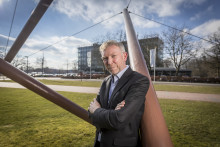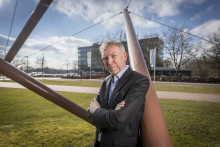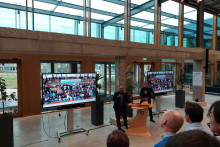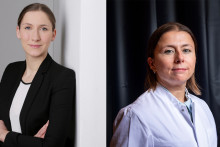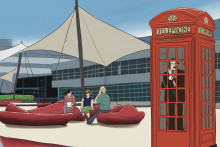How will the corona crisis affect the internationalization of the University of Twente?
‘This is of course an unprecedented situation, but we see the operational issues more as a serious hiccup rather than a system change. Internationalization is a crucial part of the DNA of the UT. It is not only about welcoming students from abroad. It is essential that we support all our students in developing their intercultural competences. We therefore also want to expose Dutch students to a culturally diverse environment. Our international classroom is not just a fashion statement. It is here to stay. International classrooms and exchange are an integral part of what we want to offer and we will do everything we can to ensure that people can go abroad again.’
Do you know when that might happen?
‘When the corona crisis started, all exchange was halted. Now we have decided that we will not allow any exchange until September. Students need to know what to expect and that is why we decided to cancel all mobility until the end of this academic year. At the end of this month, we will decide whether course work mobility will be allowed from September on, or not. About 550 students generally go abroad and, if that is not possible, they will need to make alternative arrangements. We also continue to discourage all staff from going abroad for the time being, because the situation is still too uncertain at the moment. However, the situation is constantly developing. If things change, we will of course reevaluate our choices. Either way, we will make every effort to allow exchange. That means we will also have to accept risks in case of another COVID-19 outbreak.’
Do you expect lower influx of international students in the next academic year?
‘Yes, we anticipate that the number of students from abroad will be lower. Although if you look at the preliminary enrollment numbers, they don’t indicate any extreme situation, at least not yet. The question is of course if these students will be able to come – if they will be allowed to travel, able to get scholarships and so on. The situation is extremely fluid.’
If the influx is indeed low, is that a big issue for the university?
‘About 30% of our students are international, but a large part of them comes from within the EU. We believe this group will in general be able to enroll and come. Even if that isn’t the case, we can overcome it. A smaller influx is of course not something we hope for, but it is something we can handle as a university. There would be financial consequences, but the bigger impact would be for the international classroom and the atmosphere at our campus. It makes such a difference if you are able to welcome people from all over the globe.’
Is there anything the UT can do to ensure that students enroll?
‘We are confident that we can offer something worthwhile for every student. From September on, we want to offer as much education on campus as possible again. The UT is known for personal interaction and intensive campus life, so it is important that people can meet and study together. On the other hand, we already know that not everything will be possible due to the 1,5 meters distancing rule. We’ve decided that mass lectures can be done digitally, as there is generally limited interaction between the lecturer and the students. But we will strive to offer practical classes and working groups on campus.’
As you mentioned yourself, the situation is very unstable and keeps developing. Can you already make plans for after the summer?
‘Indeed, everything is uncertain but there is one certainty – if we can still use that word these days. This certainty is the 1,5 meters distancing rule. Based on that we can calculate and taking all different factors into account, we will need to organize things completely differently. We may have use different spaces, possibly sometimes also off-campus, we may have to start at earlier hours, classes may be split up, we may have to build large tents on campus and so on. It is a complicated puzzle, but we will make it work. Our blessing is that we have very committed staff and a large campus, and so we are confident that we can offer something interesting for all students.’
If it comes to the internationalization vision of the UT, has anything changed?
‘No, nothing has changed in that regard. We are not going to entertain the discussion of whether globalization is a good idea. In academia, it is extremely important to collaborate internationally and to learn from each other. There isn’t a shred of doubt about this for us. We just may have to work harder to make it happen. We believe it is beneficial to work with people from different cultural backgrounds and we will try to encourage this also in the future.’


